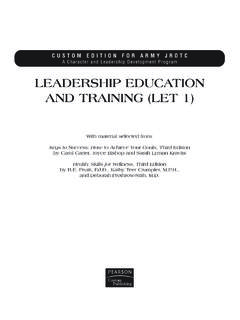Transcription of What Makes An “Effective” Leader: The Application of ...
1 International education Studies August, 200825 What Makes an effective leader : The Application of leadership Charles E. Notar (Corresponding author) College of education and Professional Studies 700 Pelham Road North Ramona Wood A3 Jacksonville State University Jacksonville, Alabama 36265-1602 Tel : 1-256-782-5832 Carol S. Uline Jacksonville State University College of education and Professional Studies Department of Secondary education Jacksonville, Alabama 36265-1602 E-mail: Charlotte King Eady Jacksonville State University College of education and Professional Studies Department of Educational Resources Jacksonville, Alabama 36265-1602 E-mail: Abstract This article is based on the premise that leadership is leadership , whatever the profession.
2 A number of leaders from various enterprises are discussed to determine the basic tenets of leadership . The nine tenets of leadership are: (1) Think and Act Strategically. (2) Understand and Demonstrate the Elements of Teams and Teamwork. (3) Master Small Group Decision Making. (4) Clearly Define Roles and Relationships. (5) Establish and Abide by a Leader-Subordinate Partnership. (6) Implement Systematic Evaluation of Policy. (7) Allocate Leader Time/Energy Appropriately. (8) Set Clear Rules and Procedures for Meetings. (9) Learn and Develop Continuously as a Leader. Keywords: leadership , Strategic Thinking, Teams and Teamwork, Small Group Decision Making, Role and Relationship Definition, Leader-Subordinate Partnership 1.
3 IntroductionTony Soprano, Vince Lombardi, George Patton, Jean Luc Picard, Rudolph Guiliani, Colin Powell, Marva Collins! You may wonder what any of these famous people have to do with leadership . They are regarded as being leaders . The authors of this article believe that leadership is leadership , whatever the profession. Regardless of scale or enterprise, there are tenets that are foundational to leadership . The literature about the individuals named previously uses various terms in its detailing how each is a leader. The authors have chosen the word tenets to embrace the terms used in the literature for leadership : traits, abilities, dispositions, characteristics, and principles.
4 Vol. 1, No. 3 International education Studies26 One answer to the question, "What Makes a leader?" is this: leaders have the qualities of determination, unselfishness, and motivation. They also possess the ability of having "people pay attention to them." Moreover, leaders inspire subordinates to achieve their potential and show them that the whole can be far greater than the sum of the parts. In addition, leaders possess good judgment, an uncanny ability to spot talent that fits the needs of the organization and situation. To that end, leaders seek people with character as well as courage and develop them into on-field leaders ," to use a football metaphor.
5 A leader's organization must provide an atmosphere of mutual admiration, a suppression of egos, and a team concept to allow the leader to overcome adversity. Ask people about their leaders or their organizations, and what would they say? Would they say "close knit," "unselfish," "proud," "well-coached, or "admired?" If so, how do the leaders make this happen? leadership . Thomas Cronin, (1992), a recognized authority on public policy, defines leadership as making things happen that might not otherwise happen, and preventing things from happening that ordinarily might happen. It is a process of getting people together to achieve common goals and aspirations.
6 leadership is a process that helps people transform intentions into positive actions, visions into reality. 2. Think and act strategicallyIn essence, the quality of leadership effectiveness is the result of disciplined adherence to a set of fundamental tenets and skills that characterize an individual. One such tenet is to think and act strategically. In fact, a leader's primary responsibility is not just developing policy; a leader must accept responsibility for shaping the future of the organization (or in an educational sense, a school or school system) by expanding mental horizons to identify and meet the challenges of the future.
7 Marva Collins, after developing her Westside Preparatory School demonstrated this tenet by shaping the expectations for her students who were labeled problem students and learning disabled students. Dr. Collins sets policy: I think of how many times visitors from all over the world have come to Westside Preparatory School and remarked: It's amazing what you do here with children. I then think how many times we have called the profits of a billion-dollar corporation a miracle. We expect profits; we expect success. Why then can't we expect the same success from our children? (para. 3) It is the policy of Westside Preparatory to expect nothing less than success for each student at the school.
8 an effective leader must have a strategic perspective always operating from the future and guiding others to the future. The leader starts with a vision and then defines the necessary strategic issues to achieve the vision. The next step is todevelop long-range goals that address these strategic issues and provides decision-making and budgetary focus for the successful implementation of these goals. Living from one annual budget to another, and from one meeting to the next, condemns a system and its future to happenstance and condemns the leader to function only as a situational leader. This type of thinking confuses governance and policy. Subordinates expect leadership , sound thinking, and decisive action.
9 3. Understand and demonstrate the elements of teams and teamwork. Another tenet of an effective leader who thinks and acts strategically is to understand and demonstrate the elements of teams and teamwork. By law, leaders exist and have authority only when their members convene as a "body" to do business. They also are a component of a corporate being which must speak, act, and fulfill its commitments with one voice, in a mature, effective , reliable manner. Consequently, leaders , a collection of diverse individuals, come together to constitute and act as an entity, and only when operating as this entity can they exercise authority and fulfill their purpose.
10 This is a classic definition of team. Carl Larson and Frank LaFasto, (1989) two authorities on teams and teamwork, define "team" as an entity comprised of two or more people working together to accomplish a specific purpose that can be attained only through a coordinated activity among the team members. In short, a team exists to fulfill a specific function or purpose and is made up of disparate, interdependent parts (individuals) who collectively achieve a capacity that none of its members could achieve individually. leaders are the catalysts for actualization. They ferment the mix.











